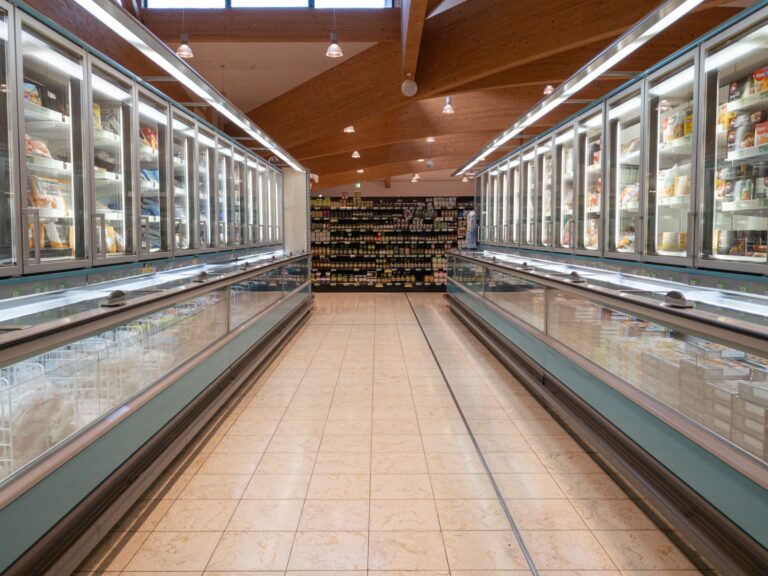To make this measure more effective and tailored to the specific context of your company, we recommend that you first perform an overall analysis of your energy situation.
Adjustment of air exchange flow rates to actual needs using a CO2 sensor
The project aims to install one or more CO2 sensors on the air intake of air handling units (AHUs) in supermarkets and to adjust the flow rate of new air introduced into the shopping centre as needed. This way, the airflow is increased during busy periods and reduced the rest of the time.
Air handling units ensure the air exchange and heating/cooling of the commercial premises. The AHUs operate at a fixed flow rate over time slots programmed according to opening hours.
By installing this technology, which has been available on the market for more than 5 years, the company can achieve significant savings on its electricity bills and reduce its carbon footprint. This measure is relatively simple to implement, has a quick return on investment and does not require production shutdown during the technical installation.
Energy and environmental impact
Adjusting the supply of fresh air according to occupancy has the effect of:
- reducing the heat consumption needed to heat the outside air in winter
- reducing the refrigerant consumption to cool the outside air in summer
- lowering the power consumption of air supply and return fans
The use of CO2 sensors with dampers and controls to adjust the flow of fresh air introduced will have a positive effect on the overall energy costs associated with air handling units. It helps reduce electricity and fossil fuel consumption if the hot water supplied to the heating coils is produced by a boiler.
State subsidy application
Aides étatiques
Please note: any application for government or non-government subsidies must comply with the “incentive effect”, subject to compliance with the subsidy conditions.
To ensure that the ‘incentive effect’ is respected, no binding commitment (signing a quotation; paying an advance) may be made BEFORE submitting the application file or receiving the agreement in principle from the State or the electricity and natural gas supplier following an application for subsidies.
Temporary environmental impact aid
Extended “SME Packages Sustainability” aid scheme, to give companies greater incentives to invest in measures that significantly improve their environmental impact. Investments under this climate protection measure amount to 70% for small enterprises, 60% for medium-sized enterprises and 50% for large enterprises, for projects costing more than €7,500, with a maximum subsidy of €100,000.
- Verification of company eligibility and costs: Ministry of the Economy (Department for Support to SMEs)
- Application deadline: 30 June 2025
- For any questions:
- Chambre des Métiers for the trades (Chamber of Skilled Trades and Crafts)
- Chamber of Commerce for companies in the non-craft sectors
- Financial Aid for small and medium-sized enterprises covering up to 70% of eligible costs for the implementation of a project aimed at reducing the environmental impact. The eligible project budget must be in a range from 3.000 € to 25.000 € excl. VAT.
- For more information:
- Chambre des Métiers for craft companies
- Chamber of Commerce for companies in the non-craft sectors
Environmental protection scheme – Investment aid for the protection of the environment
- Verification of company eligibility and costs: General Directorate for Industry, new Technology and Research
- Support in drawing up the subsidy application file prior to submission to the Ministry of the Economy
- For any questions: Luxinnovation
- More information and recommendations for companies on investing in the environment are available in the Guide simplifié pour les entreprises (Simplified Guide for Companies)
- Support in drawing up the subsidy application file prior to submission to the Ministry of the Economy
N.B. State subsidies cannot be combined for the same project
Subsidies from electricity and natural gas suppliers
Since 2015, natural gas and electricity suppliers are required to make energy savings for consumers under the obligation scheme. Since then, energy suppliers have been offering support and advice, as well as subsidy programmes for consumers to implement energy efficiency measures.
The following suppliers offer this service for companies:
N.B. Supplier subsidies can be combined with any state subsidies for the same project.Energy savings are estimated at 30% for the air handling unit consumption and 5 to 10% for overall energy consumption. This measure also contributes to a reduction of a few percentage points in the carbon footprint.
